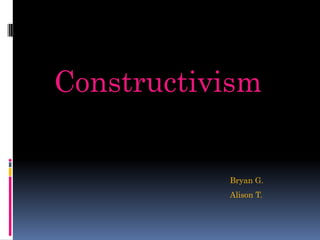
Constructivism
- 1. Constructivism Bryan G. Alison T.
- 2. Jean Piaget (1896-1980), Piaget was a psychologist who developed the cognitive learning theory after he observed children for many years. Piaget formed the 4 cognitive stages Jerome Bruner (1915- ), an American psychologist and educator who proposed that learning is an active process in which the learner constructs new ideas or concepts based on current or past knowledge Lev Vygotsky (1896-1934), a Russian educational psychologist. He developed what is known as social cognition, he believed that learning was influenced significantly by social development. John Dewey (1859-1952), was an education psychologist, philosopher, and political activist who was an advocate for child-centered instruction. Believed that learning should be engage the learner.
- 3. Students learn by doing “When students actively participate in the learning process by using critical- thinking skills to analyze a problem, they will create, or construct their own understanding of the topic or problem.”(p.376) Constructivist theory “based on a type of learning in which the learner forms, or constructs, much of what he or she learns or comprehends.”(p.376) Adaption, Assimilation, Accommodation “Adaption is their cognitive understanding or development at any given time. Assimilation: children assimilate new knowledge as the experience new things and learn new information. Accommodation: children fit this information or these experiences into their lives to change their knowledge base and to make sense of their environment”(p.378) Social Cognition “Vygotsky believed that learning was influenced significantly by social development. He theorized that leaning took place within the context of a child's social development and culture. (p.380)
- 4. Jean Piaget
- 5. Sensorimotor Imitation, learn through senses and motor activities, do not understand the world around them, and egocentric Preoperational Egocentric, pretend play, drawing ability, speech and communication development, concrete thinking, and intuitive reasoning Concrete operational Classification, logical reasoning, problem solving, and beginnings of abstract thinking Formal operational Comparative reasoning, abstract thinking, deductive logic, and test hypotheses
- 6. Teachers use Teachers generally behave in an interactive manner mediating the environment for students. Teachers seek the student's point of view in order to understand student learning for use in subsequent conceptions. Assessment of student learning is interwoven with teaching and occurs through teacher observation of students at work and through exhibitions and portfolios. Students use Students primarily work in groups. Curriculum is presented whole to part with emphasis on the big concept.(top - down) Pursuit of student questions is highly valued. Curricular activities rely heavily on primary sources. Students are viewed as thinkers with emerging theories about the world.
- 7. Alison This learning theory is present in the young children learning process. To ride a bike takes practice, its something that you just cant learn word of mouth or through text. With math, this theory best expresses my learning style; I need to be able to practice the math example to actually understand it. In my opinion, this is also the major theory behind learning sports or music. You need to actually participate to thoroughly learn the lesson. You can sit there and read about football or baseball and have the concept down, but still not know how to actually play it until you go out and play. Bryan This theory holds that the purpose of learning is for a student to construct his or her own meaning, not just memorize the “right” answers and regurgitate someone else’s meaning. One way I would incorporate this theory into my classroom is by creating an activity, project or some kind of experience so that I can set students to work as soon as possible and then teach what I want them to know and understand by offering suggestions as they work. I feel that in a classroom setting the teacher needs to create the activities that will motivate students to learn so that moments where you the teacher can explain something to each students can emerge like popcorn snapping to life in a popcorn machine.
- 8. “I hear and I forget. I see and I remember. I do and I understand.” ~Confucius
- 9. Cognitive Stages Chart http://faculty.plattsburgh.edu/william.gaeddert/images/M13-1c2.jpg- (img on slide 4) from text book Slides 2,3,5 Piaget Image http://www.flickr.com/photos/josemota/3617683026/ (img on slide 5) Children image http://01.edu-cdn.com/files/static/g/pcl_0001_0001_0_img0050.jpg (Slide 8)